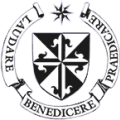
Master of Arts (Aquinas Studies) (Level 9)
Aims and Objectives
The Master of Arts (Aquinas Studies) provides students with the opportunity to:
- Study the philosophical and theological thought of St Thomas Aquinas at postgraduate level by engaging with primary sources as well as historical and contemporary scholarship on Aquinas' thought.
- Explore the historical, contextual and linguistic background to Aquinas’ thought.
- Recognise the unity of faith and reason in Aquinas’ thought, using a method which involves cross-cultural dialogue and is relevant for today.
- Contribute meaningfully to philosophical and theological scholarship on the thought of Thomas Aquinas.
Course Overview
This MA (Aquinas Studies) by blended learning is particularly suitable for those who cannot attend classes regularly. The modules are delivered by suitably qualified and experienced theologians and philosophers who are specialists in their disciplines. The MA provides an excellent foundation for further studies, teaching, pastoral and retreat work.
An option exists to exit with a Graduate Diploma in Arts (Aquinas Studies).
Assessment Method
There is a taught component consisting of eight modules (60 credits in total) delivered over three semesters of 15 weeks. A dissertation of 15,000 words (30 credits) is completed in the fourth semester.
Course Duration
Two years (part time).
Course Delivery
Delivery is through blended learning (a combination of onsite and online learning). Attendance at two onsite weekends in each of semesters 1, 2 and 3 is required.
Admission Requirements
The degree is suitable for students with a Level 8 (honours) degree in which theology or religious studies is a major component. Candidates must have obtained at least a second class honours degree. An interview is also part of the selection process. Not all candidates with the minimum requirements will be automatically accepted.
Fees
Fees are payable at the beginning of the first semester for the forthcoming year and at the beginning of the third semester for the second year. An instalment payment plan is available.
Application Fee €40
Year One €3,170
Year Two €1,785
The Total Fee is €4,995
Application Deadline
To be confirmed
Prospectus
Click HERE to download the prospectus
Modules
These are the modules available in each semester. Click each module title to view its details.
Autumn
Year 1
This module provides students with the tools to undertake research and writing at postgraduate level. It examines Aquinas’ own theological method, including his use of Scripture and the Church Fathers, his style of reasoning and the cross-cultural dialogue between Latin Christianity and Greek and Islamic philosophies. The module also familiarises students with dissertation guidelines.
The purpose of this module is to enable students to develop a basic competence in Latin (vocabulary, verbs, syntax) and achieve a beginner’s level in translation from Latin to English, with a view to working directly with Aquinas’ own text and with Aquinas scholars’ Latin usage.
This module gives a short introduction to the life and work of St Thomas Aquinas. It explains the historical background and context of Aquinas’ major works, examining the influences of Plato, Aristotle, Augustine, the Church Fathers, Peter Lombard, the Islamic philosophers, and explores his use of Scripture. It also reflects on the impact of Aquinas’ thought on Catholic philosophy and theology, and compares different understandings of Thomism.
Year 2
Students choose two elective modules from the following four options, thereby selecting either a more theological or philosophical focus.
You take 1 of these electives.
i
Metaphysics
This module introduces students to Aquinas’ philosophical thought on metaphysics, examining key ideas such as substance, essence, existence, causality, act, potentiality, form, matter and hylomorphism. It assesses Aquinas’ metaphysics in relation to Aristotle and within the context of the development of Greek philosophy. It recognises the importance of hylomorphism in relation to the understanding of the human being, which will be the foundation for the subsequent module on philosophical anthropology in Aquinas.
Credits: 10
ii
Philosophical Anthropology in Aquinas
The primary aim of this module is to provide a comprehensive exploration of Aquinas’ anthropology through close reference to the primary texts of Aquinas as well as secondary sources. This will include a detailed analysis of Aquinas’ understanding of the following: human nature, the soul and body and their unity; the powers of the soul, especially intellect and will; the theory of knowledge, and the freedom of the will; and the meaning of the term person as applied to the human being. In addition, the module has two further aims: 1) to provide an overview of the Aristotelian roots of Aquinas’ anthropology; 2) to provide an overview of contemporary developments in Thomistic anthropology.
Credits: 10
iii
Trinity and Creation
This module explores Aquinas' understanding of the Triune God with particular reference to the Summa Theologiae, ST I, qq. 27-43. In doing so, it makes continual reference to the conciliar and patristic backgrounds to Aquinas’ understanding of the Trinity. The module highlights the Trinitarian structure of Aquinas’ theology of creation and divine action in the world, ST I, qq. 44-49. It also engages with contemporary criticism of Thomas’ work on the Trinity and creation. Broader theological themes are discussed as they arise, including the relationships between the Magisterium and theological speculation, faith and reason, and scripture and theology.
Credits: 10
iv
Christ and Sacraments
This module introduces students to the Third Part of St Thomas’ Summa Theologiae. The Christology of the Third Part of the Summa shows how, in Jesus Christ, the divine and the human are united in the person of the Word (hypostatic union), how the authentic humanity of Christ expresses itself in unique forms of grace, knowledge and power, making Christ the definitive mediator between God and the human race, and how this saving mediation is exercised soteriologically in the events of his life. The module will conclude by showing from the Summa how these mysteries of Christ are forever present and active in the sacraments that he gave to his Church, and particularly in Baptism and the Eucharist.
Credits: 10
Spring
Year 1
This module examines the nature of God in the thought and writings of St Thomas Aquinas. It
does so with an emphasis on the Prima Pars of the Summa Theologiae, qq. 1-26, but focusing particularly on qq 2-13, which consider the existence of God and the divine attributes of simplicity, perfection, goodness, infinity, the existence of God in things, immutability, eternity, unity, followed by the names of God and how God is known by us.
This module explores human life as portrayed in Aristotle’s understanding of human flourishing and Aquinas’ teaching on beatitude, human acts and virtues. It examines whether human beings have a natural desire to see God, and how this differs from the operations of faith, hope and charity. It reflects on the gifts of the Holy Spirit, the new law of the Gospel, and the flowering of the Christian life, and it explores how these relate to the practical work of the cardinal virtues.
Year 2
In the second year students begin research for a minor dissertation (15,000 words) on a topic selected in agreement with the course leader and the dissertation supervisor. This module aims to assist students develop and apply research skills to a selected topic in Aquinas studies, formulate a research question following a review of relevant literature in the field, devise and apply appropriate methodology to address the research question and analyse the results deriving conclusions. It also provides students with opportunities for peer review.



